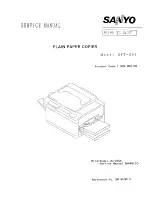
10
BYPASS FEED (including special paper)
The single bypass can be used to feed standard paper, transparency film, labels,
envelopes, and other special purpose paper. Paper measuring from A6 to A4 and in
the weight range of 52
g
/m
2
to 128
g
/m
2
can be used in this tray. (For paper weighing
from 104
g
/m
2
to 128
g
/m
2
, A4 is the maximum size.)
1
Select copy settings before you begin the copy job.
For information on the copy settings, see "MAKING COPIES" (p.11)".
2
Set the paper guides to the paper width. Insert a single sheet of
copy (print face down) into the feed slot of the single bypass.
When you insert the paper,
the unit will automatically
draw in the paper and begin
copying.
•
The single bypass can hold one sheet of paper.
•
The original image must be smaller than the paper or media for
copying. If the original image is bigger than the paper or media, this
may cause smudges on the edges of the copies.
•
If you insert a sheet of paper into the single bypass when multiple
copies have been set with the copy quantity setting (p.15), the copy
quantity setting will change to "0" and only one copy will be made.
•
When copying onto transparency film, remove each copy promptly.
Do not let copies stack up.
Note for loading envelopes
• Envelopes must be fed narrow side into the feed slot one at a time.
• Do not use non-standard envelopes, and envelopes that have metal clasps, plastic
snappers, string closures, windows, linings, self-adhesive, patches or synthetic
materials. Do not use envelopes that are filled with air or envelopes that have labels
or stamps attached.
• Envelopes of which the surface is not flat because of embossing may cause the
copies/prints to become smudged.
• Under high humidity and temperature conditions the glue flaps on some envelopes
may become sticky and be sealed closed when copied/printed.
• Use only envelopes which are flat and crisply folded. Curled or poorly formed
envelopes may be poorly copied/printed or may cause misfeeds.
Print face




































